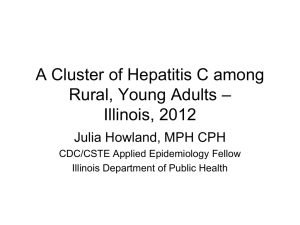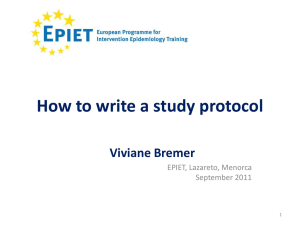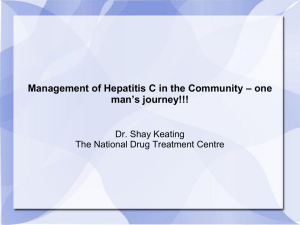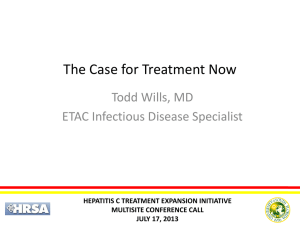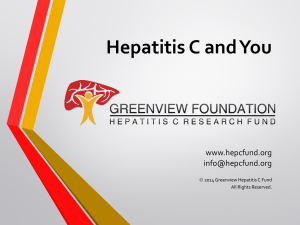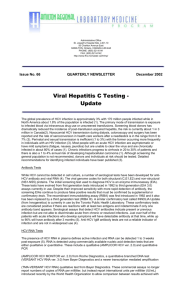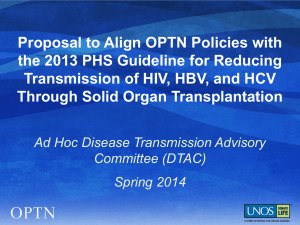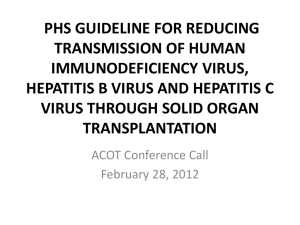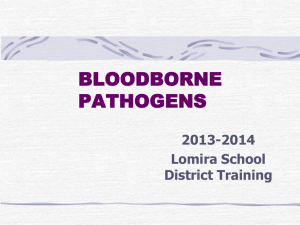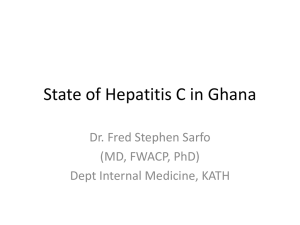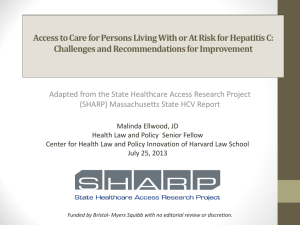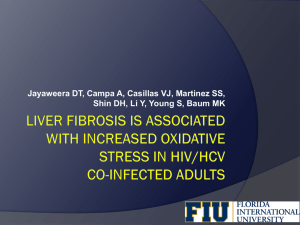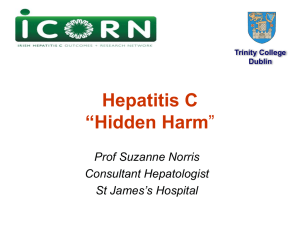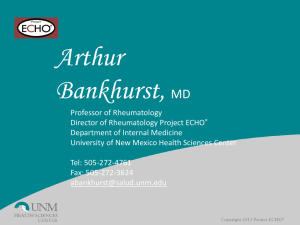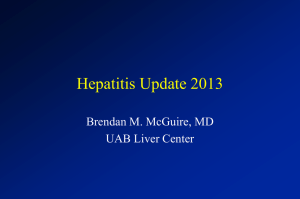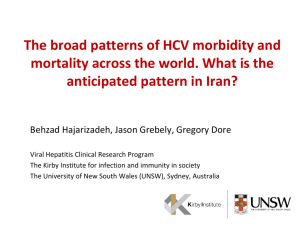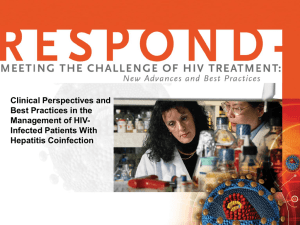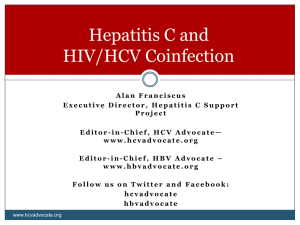HIV/HCV co-infection - Centre for HIV & Sexual Health
advertisement
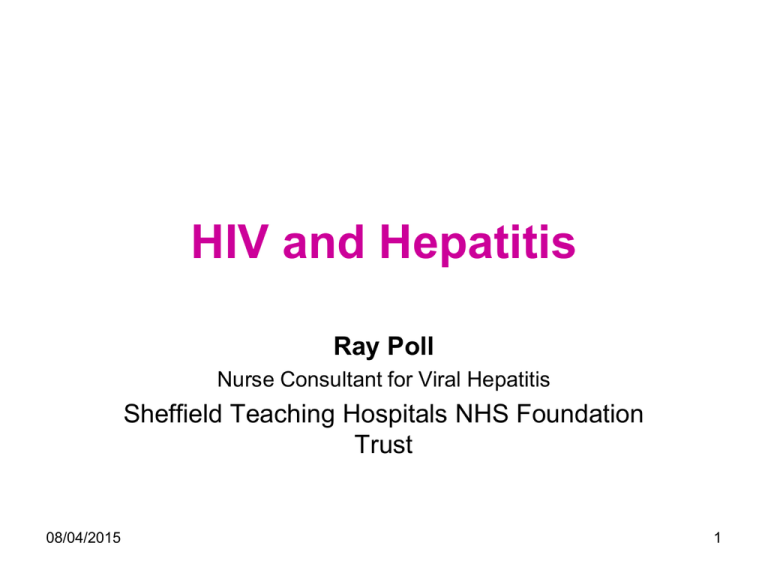
HIV and Hepatitis Ray Poll Nurse Consultant for Viral Hepatitis Sheffield Teaching Hospitals NHS Foundation Trust 08/04/2015 1 Introduction • In 93% of 100 clinics dual HIV/HBV infection rate 310% • Cases of acute HCV infection in HIV+ gay men • Incidence of HCV infection high in HIV+ IDUs (83%) • HIV causes HBV and HCV to progress more quickly • People with co-infection have higher risk of liver disease from ART but benefits of HIV treatment seem to outweigh risks from additional liver-related sideeffects 08/04/2015 2 Cirrhosis 08/04/2015 3 What does the liver do? • • • • • Stores energy Produces bile Stores vitamins and minerals, including iron Destroys and deals with poisons and drugs Produces chemicals for most of the chemical reactions in the body • Repair damage and renew itself 08/04/2015 4 Liver tests • • • • 08/04/2015 Diagnostic blood tests Liver function tests Ultrasound scan Liver biopsy sometimes 5 Liver biopsy 08/04/2015 6 Hepatitis B • Routes of transmission • Chronic infection – inversely proportionate to age • About 25% develop liver disease including cirrhosis • Treatment – lower levels of virus, not everyone needs it but for many life-long • All HBV patients screened for HIV and HDV • Immunisation 08/04/2015 7 Hepatitis B - epidemiology 08/04/2015 8 Hepatitis B tests • • • • • • 08/04/2015 Hepatitis B surface antigen (HBsAg) Hepatitis B core antibody (HBcAb) Hepatitis B surface antibody (HBsAb) Hepatitis B ‘e’ antigen (HBeAg) Hepatitis B ‘e’ antibody (HBeAb) HBV DNA 9 Hepatitis C • • • • Virus mainly found in blood Common risk factors Liver disease usually takes many years Many with chronic infection are asymptomatic • Genotypes • Treatment – curative for many 08/04/2015 10 HCV screening • All HIV-infected pts should be screened for HCV antibodies • Repeat screening – Annually – Three monthly in MSM (minimum) – Patients with abnormal LFTs • Negative HCV antibody may be associated with blunted immune response • HCV RNA should be performed for some individuals 08/04/2015 11 Case study 1 • 38yr old HIV+ gay man • ART since 2002 • Nov 2011 abnormal LFTs – unable to do HCV antibody • Dec 2011 – HCV antibody neg – unable to do HCV RNA • Jan 2012 – HCV RNA 111 • Feb 2012 – HCV RNA 281 • March 2012 – HCV RNA 3548 • HCV genotype 1 • Previous samples – HCV RNA neg Aug 2011; pos Nov 2011 • Acute or chronic infection – what treatment approach? 08/04/2015 12 Case study 2 • • • • • • • • Local outbreak of HIV among IDUs 29 yr old male former IDU Known HCV genotype 3a Previously attended RHH but lost to follow-up 2008 HIV neg 2010 Re-engaged after seen in outreach Found to be HIV positive Had HCV treatment for 48 weeks and EOT response – awaiting SVR 08/04/2015 13 When to start treatment CD4 cells/μL HBV requiring Rx HBV not requiring Rx HCV with immediate plan to start HCV Rx HCV with no immediate plan to start HCV Rx >500 Start ART in some patients (2C) (Include tenofovir and emtricitabine) Defer ART Defer ART Defer ART ≤500 Start ART (1B) (Include tenofovir and emtricitabine) Start ART (1B) (Include tenofovir and emtricitabine) 350–500 Start ART after HCV treatment commenced (1C) <350 Start ART before HCV treatment (1B). Discuss with HIV and viral hepatitis specialist Start ART (1C) 08/04/2015 14 Response rates to HCV therapy SVR rates HCV Monoinfection Overall 56-61% HIV/HCV Co-infection 27-40% Genotype 1 42-44% 14-38% Genotype 2 and 3 70-82% Up to 73% 08/04/2015 15 Case study 2 - Treatment • Cannot be sure if acute or chronic infection • Discussed merits of treatment now or later using triple therapy • Consider change of ART regime – lessen anaemia and reduce liver toxicity • Going on holiday and wishes to defer HCV treatment • In meantime stabilise on new ART regime 08/04/2015 16 HCV Antivirals in Development ANA773 PhI Miglustat Clemizole AVL-181 RG 7348 NIM-811 MK-1220 Other HCV Compounds MK5172 CF-102 Golotimod (SCV 07) sc ATI-0180 PRO 206 VBY376 PhIII GS 9256 TMC435350 PHX-1766 ACH-1095 IDX-320 Taribavirin Celgosivir ITMN-191/R7227 Telaprevir TaigGen Bio ACH-1625 Boceprevir IPH 1101 IMO-2125 IDX-136 and IDX-316 BMS-650032 MK-7009 BIT-225 PF 4878691 ACH 2928 VX-985 BI-201335 Nitazoxanide SCY-635 ITX 5061 SCH 900518 GI-5005 CYT-107 FGI 103723 IDX-375 Nov-205 Debio025 CB-5300 NA-808 PIs VX-813 ABT 450 PhIIb SPC-3649 BMS-791325 BMS-824393 PhIIa R7128 BMS 790052 PPI-461 EDP-239 Nuc polymerases PSI-7977 BMS AZD-7295 Albuferon IDX-184 NS5As PSI-879 PSI-7851 HDV-IFN (Hepasome) PF868554 sr-IFN-alpha (LG Life Sciences) IFN alpha, Medgenics (Biopump SR) Locteron CR MK3281 AZD 2795 ITCA-638 BI-207127 ABT-333 IFN-alpha-2b-medtronics IFN-alpha-2b-XL IF's Interferon-alpha (buccal lozenge, Amarillo) Belerofon Changed/additional info 08/04/2015 Suspended / Discontinued IDX-102 IDX-189 VCH 759 PEG-IL-29 P-1101 PSI-938 GS 9190 VCH-222+ Telaprevir GS9190+GS9256 ABT-072 ANA598 VCH-222 VCH 916 NonNon-nuc polymerases RG7227+RG7128 BMS-790052 + BMS-650032 IDX184+IDX320 Sources: GBI Analysis (August 4, 2010), Pipeline Sources, Company Press Releases, Reuters Knowledge Analyst Reports BI-201335+BI20127 Combination Products 17 Summary • All HIV + persons should be screened for HBV and HCV, and visa versa • Offer HAV/HBV immunisation to non-immune individuals • ‘Cure’ rates in HIV/HCV co-infection promising • Newer HCV drugs in development • HCV treatment response guided • Side-effects well managed with support of MDT 08/04/2015 18 References • BHIVA (2010) Guidelines for the management of coinfection with HIV-1 and hepatitis B or C virus. • BHIVA (2012) Guidelines for the treatment of HIV-1 infected adults with antiviral therapy. • EASL (2012) Clinical Practice Guidelines: Management of chronic hepatitis B virus infection. • National AIDS Trust (2012) Hepatitis C and HIV Coinfection. www.NAT.org.uk • NICE (guidance for treatment of HBV and HCV monoinfection) www.nice.org.uk 08/04/2015 19 Thank you for listening! Does anyone have any questions? 08/04/2015 20 Contact details Ray Poll Nurse Consultant for Viral Hepatitis Room E86, Department of Infection and Tropical Medicine, Royal Hallamshire Hospital, Glossop Road, Sheffield S10 2JF Tel: 0114 271 1776 Pager: 07623 857909 E-mail: ray.poll@sth.nhs.uk 08/04/2015 21

